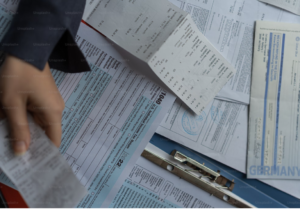
New York’s tax environment is important to understand if you plan to retire there. While living in New York can be a fun and enjoyable way to spend your retirement years, becoming familiar with the tax laws will help you maximize potential tax benefits for yourself.
In this article, we will provide an overview of things that you can do to ensure the best possible situation for yourself concerning your retirement in the state of New York. This includes investing wisely, taking advantage of potential income sources, and gaining a thorough understanding of the state’s tax laws.
Understanding Taxes in New York
Every state differs in its tax code. In New York, there is a graduated income tax, which ranges from 4-10.9%. In addition, there are some local jurisdictions that impose local income taxes, as well.
New York also has a 4% state sales tax and also allows for local sales taxes. The combined average state and local sales tax is just over 8.5%. Unfortunately, New York is considered to have one of the least favorable tax climates overall for people during their working years. For retirees, however, the picture is better: Social Security is not taxed, and withdrawals from other types of retirement accounts are taxed only minimally. In this respect, New York offers a favorable climate vis-a-vis other states.
3 Investing Strategies for Retirees
Including a combination of investment types that provide both stability and potential growth in your retirement portfolio is optimal. Financial experts recommend broad asset allocation, not only among types but also across different geographic locations. Look into asset investment in other countries as a way of giving yourself additional diversity.
Let’s now take a look at some of the things you might include in a portfolio.
Precious Metals Investment
Gold, silver, and platinum have proven to be very stable investments over time. The reason for this is that these metals have a long history of value, even as far back as ancient civilizations.
Investing in precious metals is still a reliable strategy for properly preparing for retirement in New York. Gold in particular is seen to have an inherent value both because of its aesthetic qualities and inability to corrode. The State is a hub for financial activities and you can find plenty of places to buy gold in New York either physically or online. You can buy it in bullion form, in precious metal stocks, and in the form of jewelry, too. Just keep in mind that you need to pay a 4% sales tax here like in many other states.
ETFs and Mutual Funds
Diversifying stock types and bundles can help ensure that volatile stocks are balanced by more stable ones. In particular, investing in ETFs or mutual funds can be a wise way to diversify your investments.
As these funds tend to contain more components than standard stocks, you can hedge your potential losses more easily by including a variety of different kinds of stocks in them. The capital gains that accrue on ETFs and mutual funds are taxable in New York state at a rate of 10.9%.
Annuities
Annuities can be a reliable way to invest in an insurance plan and know that you will receive payments back when you retire. While you are working, you pay into an annuity account either on a regular basis or in single, lump-sum payments. The holding institution will later provide you with regular payments potentially throughout the entire period of your retirement.
Single-payment annuities in particular are considered reliable because they guarantee a fixed rate of return. In other words, however severe a recession might be, the holder will receive the same payments regardless of what is happening in the stock market. In New York State, annuities are taxed, but retirees are eligible for an annual $20,000 exclusion. Income over this amount will be subject to taxation.
Embracing Residual Income Streams
Residual income is the money that you have after initial investments have been completed, or obligations have been fulfilled. It is sometimes referred to as discretionary income, and it can come from both active sources, such as side jobs, and passive sources, such as the receipt of dividends.
Types of Residual Income
There are a number of ways to earn residual income, depending on your investment types and willingness to take on additional work outside your regular job. These include the following:
- Investing in real estate. If you own property, you can rent it out and include the money you make from your renters in your larger portfolio. Although you will have to put work into maintaining your property and addressing any needs that your renters might have, this can be an effective way to make money. New York is considered to be a landlord-friendly state because of comparatively high rent prices. Rental income is taxed in New York by subtracting expenses from rent; the remainder is taxed as income.
- Stock dividends. Many types of stocks offer dividends on a quarterly basis that can provide a decent amount of money that you can add to your budget. In New York, stocks are taxed as regular income.
- Creating a bond ladder. A bond ladder is a series of bonds of increasing levels of maturity that reduce the risk involved in traditional bond investment. It is a popular option among retirees. Bonds are generally not subject to taxes, but this varies depending on the type that you buy.
- Taking on side hustles. Many people are generating additional income for themselves these days by becoming professional bloggers, participating in affiliate marketing, writing e-books, or taking on other jobs that don’t require formal working hours and can be done remotely.
- Royalties. Royalties are payments that are earned on the creation of a specific product, such as a book or a product patent. Depending on where your talents and interests lie, you might be able to produce something that will give you royalties for as long as people keep buying it. These can come in any amount, depending on the popularity of what you produce, and potentially keep coming for an indefinite amount of time. Royalties are also generally taxed as ordinary income.
In general, the extent to which residual income will affect your tax situation depends on where exactly the income comes from and how great it is. Again, each type of residual income has its own specifications with regard to taxation.
Utilizing Tax-Advantaged Retirement Accounts
There is a category of retirement account types that are generally known as “tax-advantaged.” This refers to accounts, investments, or savings plans that are either exempt from taxation, tax-deferred, or offer some other type of tax benefit.
Tax-advantaged retirement accounts include 401(k) plans, 403(b) and 457 plans, IRAs, Health Savings Accounts, and municipal bonds. In particular, Roth IRAs and Roth 401(k)s are known to offer benefits in retirement. These accounts are subject to the same taxation rules in New York that annuities are.
Estate Planning and Tax Implications
Estate planning is the process of preparing for the management of an individual’s assets after he or she dies. In New York state, a surviving spouse is entitled to one-third of a deceased spouse’s assets, or $50,000 – whichever is greater – upon death unless otherwise stated.
There are several important components to estate planning. These include the following:
- The creation of a will. In an individual’s will, there is a description of how their assets will be distributed after their death.
- Trusts. Trusts are legal entities that contain assets designated for specific beneficiaries. There are two types of trusts: revocable trusts, or those that can be changed, and irrevocable trusts, or those that cannot be changed.
- Power of attorney. Retirees should also create a financial power of attorney. This is a legal document in which an agent is designated to manage the individual’s affairs in case the individual cannot. There is also a healthcare power of attorney, in which an agent is designated to make medical-related decisions for an individual if he or she becomes incapable of doing so.
In the process of estate planning, it is essential to take tax implications into consideration. When a person dies, their assets could be subject to estate or inheritance taxes. New York is one of 15 states that impose these taxes, which can be at a rate of up to 16%. And this is in addition to federal estate taxes.
Final Thoughts
As mentioned above, retirement planning can be a complicated process and one that requires a lot of different considerations. Each state has its own requirements with regard to taxation, so if you live in New York you should learn the intricacies of the state’s tax laws before you start your retirement planning. And it would be worth your while to consult a financial advisor.
If you plan carefully, diversify your investment portfolio, and take care of your estate planning adequately, you should be in good shape to enjoy a rich and happy retirement in New York.






